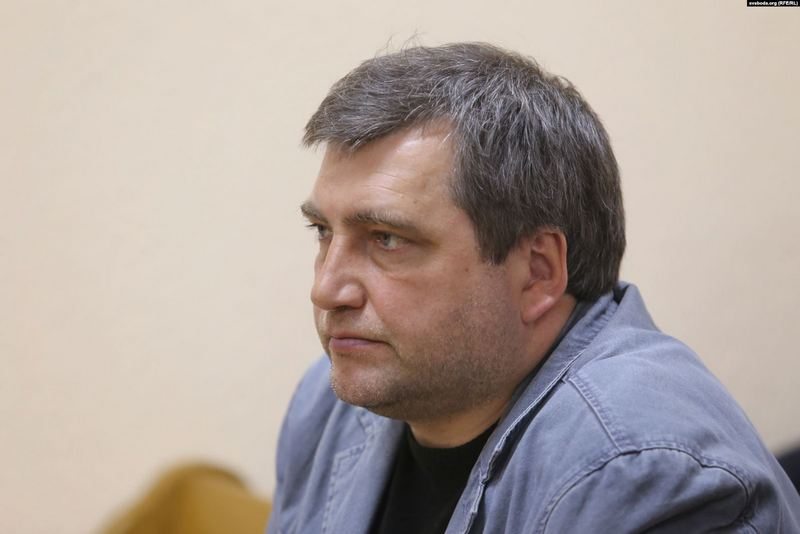2024, the darkest and most repressive year for Belarusian media
Repression against journalists, bloggers, and other media representatives in Belarus has escalated to disastrous levels over the past year. According to the Belarusian Association of Journalists, at least 45 media representatives are behind bars as of December 20, cases are being initiated against journalists in absentia, and some face repeated convictions. For comparison, as of the end of 2023, there were 32 imprisoned journalists.
The fourth-largest number of imprisoned journalists in the world
The statement by the Belarusian Association of Journalists (BAJ), calls on the Belarusian authorities to release journalists who are political prisoners and all political prisoners:
"The situation with freedom of expression and independent media in Belarus remains one of the worst in the world. In the Press Freedom Index 2024, Belarus ranks 167 out of 180 countries. Compared to the previous index, Belarus has experienced a 10-place decline. A recent study by Reporters Without Borders has revealed that Belarus is currently ranked fourth in the world in terms of the number of journalists imprisoned. The government employs anti-extremism legislation to impede the operations of independent media outlets. The majority of independent media and media organizations, including the BAJ, have been designated as extremist entities."
"Extremists", "detractors", and "traitors"
By the end of 2024, 45 journalists and bloggers remain behind bars. Deputy Chairman of the BAJ Aleh Aheyeu, speaking at the Forum of Free Journalism in the Lithuanian Seimas, noted that this figure is incomplete:
"We, and I personally, know for sure that there are more of them. Many people, before their detention, or their relatives, ask not to voice these facts, that there was a search or detention. We can't publish everything we know, and there are still facts that we don't know."
The most common criminal article under which media representatives were convicted or charged is "creation or participation in an 'extremist' formation" (Part 1 or Part 3 of Article 361-1 of the Criminal Code). The prosecution used it in 21 cases.
The next article regarding the number of uses (in 12 sentences) is Article 130 of the Criminal Code (incitement to social hatred or hostility). Then, in 11 cases, media workers were tried for facilitating "extremist" activities (Parts 1 and 2 of Article 361-4).
In terms of the number of sentences under other articles, the situation looks like this:
7 people were convicted for "organizing and preparing actions that grossly violate public order, or participating in them” (Part 1 of Article 342 of the Criminal Code);
Five sentences under each article: for "discrediting Belarus" (Article 369-1 of the Criminal Code), "calls for sanctions" (Part 3 of Article 361 of the Criminal Code) and "treason to the state" (Article 356 of the Criminal Code).
In eight cases, defamatory articles were used for criminal prosecution — insulting Aliaksandr Lukashenka and insulting representatives of the authorities.
Maya Sever: "It's hard to imagine all the horrors of Belarus"
On September 10, in Vilnius, the president of the European Federation of Journalists Maya Sever, giving a talk at a conference on the work of the Belarusian media, spoke emotionally about the situation with freedom of speech in Belarus. She survived the socialist dictatorship, the wars in Croatia and Bosnia and Herzegovina, and fought censorship and persecution all her life. However, even for a journalist with such an immense life and professional experience, "it is difficult to imagine all the horrors of Belarus," where cooperation with the BAJ, a professional association of journalists, can entail 10 years in prison.
The defenders estimated that the average term of imprisonment for Belarusian journalists is six years. However, some media representatives have received huge sentences for their legitimate activities.
We have collected the maximum terms of imprisonment for media workers:
Ihar Losik, 15 years;
Andrei Aliaksandrau, 14 years;
Dzianis Ivashyn, 13 years;
Liudmila Chekina, 12 years;
Maryna Zolatava, 12 years;
Valeryia Kastsiuhova, 10 years.
December: a dark time for Belarusian journalism
The last month of this year was marked by a surge in repression against media representatives. Thus, on November 28, blogger Dzmitry Kazlou ("Gray Cat") was supposed to be released from Babrujsk penal colony No. 2 after four and a half years of imprisonment.
However, on November 29, he was tried again in the Court of the City of Babrujsk and the Babrujsk District — Dzmitry was accused of malicious disobedience to the demands of the correctional institution administration (under Article 411 of the Criminal Code).
On December 11, the trial of political prisoner, journalist, and blogger Ihar Karnei, took place in the Škloŭ District Court. The man had been sentenced to three years of imprisonment in March this year. Judge Aliaksandr Tarakanau found Ihar guilty under Part 1 of Article 411 of the Criminal Code (malicious disobedience to the demands of the penal colony administration) and sentenced him to another eight months of imprisonment.
The most recent verdicts and charges
On December 10, political prisoner journalist Volha Radzivonava was sentenced to four years of imprisonment under several articles of the Criminal Code for collaborating with a German newspaper Die Tageszeitung. The judge of the Minsk City Court, Vera Halaukova, handed down a verdict under four articles on defamation: Article 368 of the Criminal Code—insulting Aliaksandr Lukashenka, Article 130 of the Criminal Code—inciting social hatred or hostility, Article 367 of the Criminal Code—slander against Lukashenka, and Article 369-1 of the Criminal Code—discrediting Belarus.
Only now has the verdict of Pinsk journalist Yauhen Mikalayevich, who returned to Belarus, become known. In early October, a court in Pinsk found him guilty under Part 1 of Article 342 of the Criminal Code (organization and preparation of actions grossly violating public order or active participation in them.) He was sentenced to one and a half years in a general security penal colony. In 2020, Yauhen covered the protests in Pinsk.
At the end of the year, three more media workers are awaiting trial: Daniil Palianski, Anton Kazelski, and Ihar Ilyash. The Belarusian human rights community recognized all of them as political prisoners.

In early December, it became known about the detention of seven employees and journalists of a dissolved private newspaper Intex-press in Baranavičy under Article 361-4 of the Criminal Code (promotion of extremist activities).
Special proceedings are a repressive trend of the year
Deputy Chairman of the Belarusian Association of Journalists Barys Haretski names the so-mentioned absentee judicial proceedings among the trends of the past year and even suggests calling "special proceedings" the phrase of the year:
"Special proceedings is probably the phrase of the year for the Belarusian media community. This year, the repressive measures of the authorities against journalists who left Belarus have become extremely active. Almost 60 searches have been recorded so far. Conducting these special proceedings and initiating criminal cases in absentia, the authorities confiscate property.”
On December 3, it became known that a criminal case in absentia was initiated against journalist Ales Liauchuk under Article 368 of the Criminal Code of the Republic of Belarus — "insulting Aliaksandr Lukashenka". Žabinka district department of the Investigative Committee handles the case. The reason for the criminal prosecution was Ales Liauchuk's Facebook post, which the security forces saw as an insult to Aliaksandr Lukashenka. After his forced emigration in 2021, the journalist has continued his activities from abroad.
On December 2, the security forces searched the relatives of former Belsat journalist Siarhei Skulavets. In September of this year, it became known that the Investigative Committee had initiated a criminal case against him in absentia.
On December 16, it became known that "special proceedings" were also launched against blogger Siarhei Biaspalau. He is accused under 10 articles of the Criminal Code of the Republic of Belarus.
Dozens of representatives of the media sector went through the special proceedings procedure, including Pavel Marynich, Yury Drakakhrust, Hanna Liubakova, Uladzimir Khilmanovich, Andrei Pavuk, Anton Matolka, Ihar Kazmerchak, Ales Kirkevich, and others.
Andrey Bastunets: "We see the continuation of the persecution of journalists in an extremely uncertain external situation"

Andrei Bastunets, Chairman of the Belarusian Association of Journalists, described 2024 as a turbulent year for the journalistic community:
"This year has been disorderly, and this is primarily due to the conflicts that are taking place all over the world. To date, we say that we know at least 45 journalists and editorial staff who are behind bars, although more recently there were about 35 of them. And this does not really correspond to the words about the humanization of the Belarusian regime."
Andrei Bastunets also emphasizes that during this difficult period, journalists continue to fulfill their professional duties.
"Next year will be indicative of how sustainable the media sector will be. After all, in addition to criminal prosecution, there are also special proceedings that have been actively used recently. In addition, there are problems with financing and problems with security for those inside Belarus. In the next two years, it will be seen to what extent we are able to withstand these challenges. But I would like to hope that over these two years the situation will change in such a way that we will be able to solve these problems inside the country," says Andrei Bastunets.


















